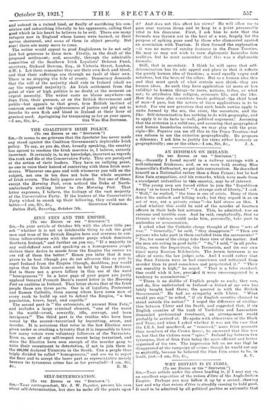SELF-DETERMINATION. [To. THE EDITOR OP THE " SPECTATOR."] SIE,—Your correspondent,
Mr. J. W. Poynter, presses his case about self-determination, but does he make all the points upon
it? And does not this affect his views? He will allow me to pass over various items and to keep to a point presumably vital to his discourse. First, I ask him to note that the formula was thrown out in the heat of a war, largely for the purpose of spiking guns used by those who clamoured against an association with Tsarism. It then formed the explanation —it was no more—of sundry features in the Peace Treaties. Ho may or may not wish to turn diplomatic formulas into realities, but he must remember that this was a diplomatic formula.
Still, that is secondary. I think ho will agree that self- determination has its solo appeal and place in that it reflects the purely human idea of freedom; a word equally vague and nebulous, but the basis of the other. But as a human idea this and that must speak of what certain men think—they are human ideas. As such they have application (of more or less validity) to human things—to races, nations, tribes, or what not; to attributes like religion, economic life, and the like. flow far these also constitute bonds political—tile chief bond of man—I pass, but the nature of these applications is to be noted. For one now perceives that such bonds nowise apply to units formed by the sea, the river, the mountain, and the like. Self-determination has nothing to do with geography, and to apply it to its facts is—well, political argument! Assuming that the criterion is a valid one, and assuming that geographical and human boundaries coincide, wo may play with the prin. ciple—Mr. Poynter can see all this in the Peace Treaties—but one refuses to use the criterion geographically. Ho proposes a dilemma; I ask him to justify his views either humanly or
geographically; one or the other.—I am, Sir, &c., J. A.






































 Previous page
Previous page